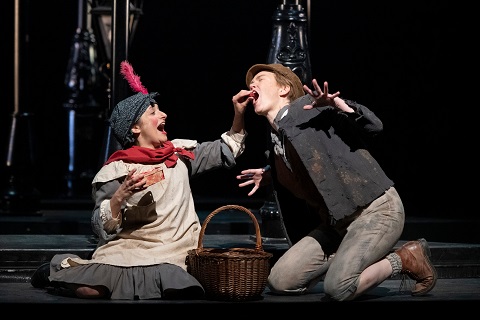But from our contemporary perspective it is difficult to make such a
setting seem anything but picturesque, so opera directors have mined the
psychological elements underlying the story. Two iconic 20th century
productions, that of David Pountney for English National Opera and by
Richard Jones for Welsh National Opera set the piece in urban 1950s with
the wood and the witch representing a psychological nightmare based on
reality.
Stephen Medcalf's production of Englebert Humperdinck's Hansel and Gretel
was shared between the Royal Northern College of Music (where it debuted
last year) and Grange Park Opera, where we saw the second performance on
Thursday 27 June 2019. Caitlin Hulcup was Hansel and Soraya Mafi was Gretel
with Susan Bullock as Mother and the Witch, William Dazeley as Father,
Lizzie Holmes as the Dew Fairy and Eleanor Sanderson-Nash as the Sandman.
George Jackson conducted the orchestra of English National Opera.
Medcalf and his designer Yannis Thavoris set the piece in the 1890s with
the family as urban poor, whilst the 'forest' is simply the outside city
(Thavoris provided a striking forest of street lights) and foraging for the
children consists of scrounging and stealing Oliver Twist-style. The
witch's house is in fact a magic sweet shop, but its interior is a
magically larger version of the children's home. All this would seem to
provide some interesting psychological layers to explore, particularly as
the production had Susan Bullock doubling as the Mother and the Witch.
In fact the urban forest entirely lacked a sense of danger and, populated
during the Witches ride by a cast of Dickensian-type characters, seemed
simply picturesque with the children remarkably in charge of their own
destiny. Whilst the third act's setting in a version of the children's home
had interesting resonances, none of this was explored as Susan Bullock's
Witch was a magnificently comic creation which had little link, physical or
metaphorical, to her performance in Act One as Mother.
The intention, as with the Royal Opera's disappointing recent new
production of the opera seemed to be to provide an evening of unthreatening
entertainment, and within these constraints Medcalf's production was
surprisingly imaginative, and coupled to one of the finest musical
performances of the opera that I have heard in a long time.
The musical delights started with the first notes of the overture as the
horn melody rose out of the pit, rich in texture and beautifully shaped.
George Jackson and the orchestra brought out the well-made counterpoint
which underlies Humperdinck's score. Yes, the glorious melodies were there,
finely phrased and, well, glorious. But weaving them together was a sense
of this beautifully made German counterpoint, which showed the work's
complex history. The orchestra of English National Opera seemed to be
demonstrating what we were missing by not using a full orchestra for ENO's
recent production of Hansel and Gretel at Regent's Park Open Air Theatre.
And George Jackson, a young conductor to watch, was clearly alive to the
various resonances in Humperdinck's score. Yes it is Wagnerian, but I also
heard pre-echoes of Mahler in the Act Two folk-sequences. Throughout the
amount of detail was wondrous, yet woven into an enchanting construction
which mixed humour with the magical. The angel pantomime at the end of Act
Two provided the element of transformative radiance, which was entirely
lacking in Medcalf's lamp-lighter's ballet. Whatever other musical delights
the production offered, and there were plenty, I kept coming back to
Jackson and the orchestra.
Soraya Mafi and Caitlin Hulcup made a delightful pairing as Gretel and
Hansel, for all the picturesque charm of the characters' depiction there
was a fundamental seriousness to their performance which emphasised the
music's quality. Mafi was a poised Gretel, shaping the lovely melodies
carefully and expressively, and she was matched by Hulcup's wonderfully
boyish Hansel (one of the best 'boys' I have seen in this opera for a long
time), with the two voices blending and contrasting. They kept the action
moving so that the scenes between them in the first two acts, which can
sometimes drag somewhat, flew by.
There was a fundamental realism to Susan Bullock and William Dazeley's
performances as Mother and Father which anchored Act One in the real world
rather than magic or fairy-tale, and this vastly benefitted the
performance. Both were well sung, providing rounded depictions rather than
just sketched in 'characters'. Bullock was transformed in Act Three and her
Witch was a gloriously comic creation, vocally commanding and delightfully
outrageous.
Eleanor Sanderson-Nash's Sandman was a louche opium addict, a picturesque
and nicely bohemian touch, whilst Lizzie Holme's charming Dew Fairy was in
fact the milk-man. Both women looked unrecognisable in the male personae.
The women from this year's ensemble at Grange Park Opera provided the
children's chorus at the end, appearing from the oven as a fleet of
refugees from Oliver Twist.
For some reason this was sung in German, when the accessibility of the
production would have suggested using an English translation. But the
cast's diction was excellent and all made Humperdinck's setting of the
German tell.
George Jackson, the orchestra and the cast made this performance a musical
delight which meant that the music transcended the rather picture-book
nature of the production, giving us a highly musically literate and
satisfying evening.
Robert Hugill
Hansel: Caitlin Hulcup, Gretel: Soraya Mafi, Witch / Mother: Susan Bullock,
Father: William Dazeley, Dew Fairy: Lizzie Holmes, Sandman: Eleanor
Sanderson-Nash; Director: Stephen Medcalf, Conductor: George Jackson,
Designer: Yannis Thavoris, Lighting design: Jason Taylor.
Grange Park Opera, West Horsley Place, Surrey; 27th June 2019.
